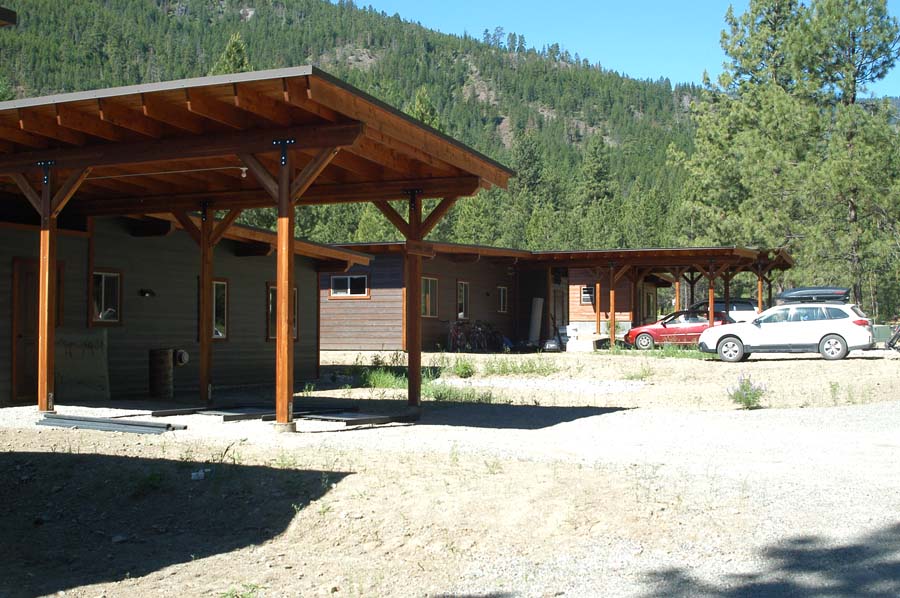Homecoming: by Ann Mcreary, Methow Valley News
Originally published June 26, 2019 in the Methow Valley News by ANN MCCREARY
Photos by Ann McCreary
Theresa Days at her new home on Canyon Street in Twisp: regaining a sense of belonging in the community.
The Methow Housing Trust makes affordable ownership real
As she stood in the front yard of her new home on Canyon Street in Twisp, Theresa Days said buying her house means much more than having an affordable place to live. The experience has helped her regain a sense of belonging to a caring community.
“When my dad died, when I was 10, the community came together and helped,” said Days, 62, who grew up in the Methow Valley. “That’s what this is feeling like again. People are helping each other. That’s what this valley has always been about.”
Days was able to buy her two-bedroom home through the Methow Housing Trust, a nonprofit organization that is building homes in Twisp and Mazama for local residents who could not otherwise afford to buy a house.
A few years after her father died, Days moved away from the Methow Valley when her mother found work in Wenatchee, but “the valley was always home to me,” Days said. She moved back to 15 years ago and lived most recently with her partner in a small, federally subsidized apartment in Twisp.
A friend encouraged her last year to look into the new Canyon Street Neighborhood being developed by the Methow Housing Trust to provide affordable home ownership. Days said she tends to be mistrustful of people and their intentions — a result of past abusive relationships. So, she approached the staff of the Housing Trust cautiously.
“I told them at the time I was kind of leery. My trust level wasn’t very high, and it [the new homebuying approach] was a whole new thing,” Days said. “They explained it to me well. They helped me look at the money and connected me with the finance people.”
A retired state employee with a pension and social security, Days was initially turned down for financing. “The Housing Trust [staff] said, ‘Don’t worry.’ They were so helpful and nice.” Housing Trust staff found another lender that was able to qualify Days to buy her home.
In the living room of her house, where boxes still held pictures to be hung on freshly painted walls, Days smiled as she gazed around the home that she shares with her partner, Pat Jones, and his dog. “I plan on living here for the rest of my life. I keep telling myself, ‘This is the last time you have to move, ever!’”
Gaining independence
Louisa Moratti and Matthew Pickard moved into a new home near Mazama.
Like Days, Louisa Moratti and Matthew Pickard are settling into their new home, but at the other end of the valley. Moratti and Pickard recently moved into the two-bedroom house they purchased in the McKinney Ridge Neighborhood, developed by the Methow Housing Trust near Mazama.
Moratti and Pickard are relative newcomers to the Methow Valley. They first learned of the Methow Valley from a climbing guide book while they were living in Arizona. In 2015 they sold most of their belongings and set out in a van to check out the valley.
“We fell in love with this place. We both started working at the Mazama Store, and were struggling to find a rental that was affordable. For a while, we were living in our van,” said Moratti. They spent some time living with friends, and later rented a home that was being built by Moratti’s parents. When they heard about the new Housing Trust homes, they saw an opportunity “to hopefully get our own place and be independent,” Pickard said.
Moratti, 33, works full time as a baker at the Mazama Store. Pickard, 38, was forced by unexpected health issues to quit working as a climbing coach a couple of years ago, and is developing a business that provides three-dimensional computer modeling for home designs.
“We’ve moved around a lot of places and dealt with the common issue of rents getting raised. We had become exhausted by that process,” Moratti said.
“We knew we wanted to be in the valley and we knew that owning a house wasn’t an option,” Pickard said. “It’s out of our budget to afford — anywhere. With our career paths, we don’t make a lot of money, but we make enough to live comfortably enough.”
They heard about the Housing Trust through friends, and went to the office in Twisp last fall to fill out paperwork and learn if they could qualify to buy a house in the McKinney Ridge Neighborhood development.
“The main driving factors were independence, and the ability to grow roots in a community that we wanted to be part of, and find stability in a world where that’s difficult to find,” Moratti said. “We kept crossing our fingers, hoping we’d fit what they were looking for,” Pickard said.
They were a good fit, and moved into their home, along with their dog, in May. The house is sparsely furnished because they are building their own furniture, but they are thrilled with their home.
“It’s beautiful. It’s a dream come true. I could never have imagined it would be so lovely. It’s very well built and incredibly energy efficient,” Pickard said.
“I view living here as a permanent thing,” he said. “If we make more money in the future, they adjust the payments we make. If we do make more money, it’s OK to still be here in the house. We can grow financially.”
More homes
More Methow Housing Trust homes are being added to the McKinney Ridge neighborhood near Mazama.
The five homes completed in Twisp and the four completed in Mazama are the beginnings of larger neighborhoods. Ground has been broken on four homes in the Canyon Street Neighborhood and four homes in McKinney Ridge. Those units are expected to be ready for occupancy by spring of 2020. An additional four homes will be built on Canyon Street in 2021, bringing the total to 13. The Housing Trust has also acquired 8 acres in Winthrop and is conducting a needs assessment to plan for future development.
As Days settled into her Canyon Street home, she has been getting acquainted with the other homeowners and enjoys feeling a sense of belonging. “One of the things I like about it is we get to be our own little community,” she said.
The homes in Twisp and Mazama have landscaping and irrigation systems, as well as fenced back yards, covered parking and storage areas. Each neighborhood includes two-bedroom and three-bedroom homes that are single-story and have one bathroom. The homes are built in close proximity but are designed to provide privacy.
The houses are compact, ranging in size from about 900 – 1,100 square feet, with an open living room and kitchen floor plan that creates a spacious feeling, and large windows that bring in natural light. The homes are designed to be “ADA-ready,” which means they don’t have steps and can be modified with railings to accommodate people with disabilities, or to allow people to age in their homes.
Erika Krumpelman, the Housing Trust’s stewardship director, has helped more than 30 applicants with their application and lending process over the past year, and has matched seven homeowners (including individuals, couples, and parents with children) with homes. The Housing Trust maintains an open application process and is accepting applications for existing houses and for houses expected to be completed in the next two years.
“Through the process of the application we really get to know our homeowners. It’s been a really great process and we’re so excited to see them move into their forever home,” Krumpelman said.
While their Methow Housing Trust house may be the final home for some buyers, “some aspire to look at it as a stepping stone,” Krumpelman said. “They know if they live in the home for five to seven years, they will have a nice nest egg for a down payment for their next home.”
In order to keep the homes permanently affordable, a formula limits the increase in resale value to 1.5 percent annually — considerably lower than market increases in property values. But even with the limit on the growth in resale value, homeowners can expect to pay down their loan enough to “walk away with $30,000 – $40,000 after seven years, and that’s a down payment” on a new home, Krumpelman said.
For ‘ordinary people’
The houses cost about $140,000 for two-bedrooms and $160,000 for three-bedrooms. “That’s about half — a little less than half — what a comparable home on the open market would cost,” Krumpelman said.
Buyers of a Methow Housing Trust home own the building and sign a long-term lease for the land it sits on. Basic eligibility requirements for buyers include living in the Methow Valley for at least 12 months or having a written commitment from a local employer; household income that does not exceed 100 percent of the median income for Okanogan County; personal assets that do not exceed 80 percent of the area median income; and the ability to qualify for an approved mortgage.
The Methow Housing Trust was created to meet a pressing need for housing that is affordable for ordinary working people or for retired people, like Days. When Days purchased her own home, it allowed her and her partner to move out of the subsidized apartment where they’d been living. And that made an affordable rental unit, which are in short supply in the valley, available for another valley resident with a limited income.
That is a desired outcome, said by Rocklynn Culp, a Housing Trust board member and town planner for Winthrop. “I expect [these new homes] to have a ripple effect by opening up more rentals in a tight rental market,” Culp said.
Affordable housing is essential to the Methow Valley’s economic sustainability, Culp said. “I see these new homes first and foremost housing people who now have a more secure future in our community. Without Methow Housing Trust, there is really no game in town for affordable home ownership, nor any relief to the situation of workforce housing. We’re on the cutting edge of building economic resiliency.”



